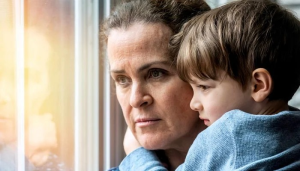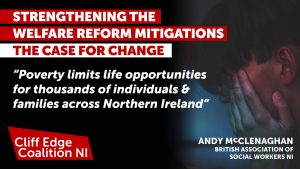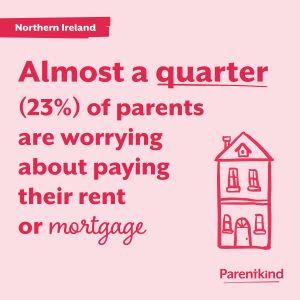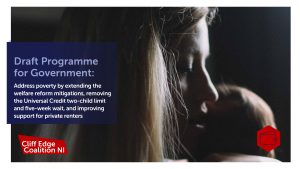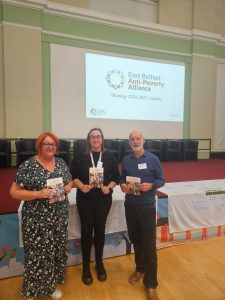Women and Hunger
16 October 2023
By Jonny Currie
The Trussell Trust is an anti-poverty charity that supports a network of food banks across the UK while campaigning for an end to the need for emergency food. There are 22 food banks operating at 50 locations in the Trussell Trust network across Northern Ireland.
Hunger in Northern Ireland, published by the Trussell Trust, finds that, in mid-2022, one in six people across Northern Ireland (16% of population) faced hunger in the last year because they didn’t have enough money. This equates to around 354,000 people, around the population of Belfast and the surrounding district.
Being forced to turn to a food bank to feed your family is a horrifying reality for too many people in Northern Ireland, but as Hunger in Northern Ireland shows, this is just the tip of the iceberg. Many more people are struggling with hunger. This is not right. Food banks are not the answer when people are going without the essentials in one of the richest economies in the world.
We need a social security system which provides protection and the dignity for people to cover their own essentials, such as food and bills. We also need urgent restoration of the Northern Ireland Executive and Assembly to prioritise the policies that will protect people, such as the full implementation of recommendations from the reviews of welfare mitigations and discretionary support, and the delivery of an anti-poverty strategy.
Jonny Currie is the Northern Ireland Lead for The Trussell Trust
Hunger in Northern Ireland: The disproportionate impact of hunger on women
by Helen Barnard, The Trussell Trust’s Head of Policy, Research, Policy and Impact
It is often said that women are the ‘shock absorbers’ of poverty. They are not only more likely to live in poverty; they are also often the people trying to manage a tight budget, working out how to stretch it to cover what everyone in the family needs. Many times, they go without, not only to protect their children from hardship but also to protect other adults in the family. Now new research from the Trussell Trust has laid bare the scale of hunger across Northern Ireland and the disproportionate impact it has on women.
Women make up half the population of Northern Ireland (52%) but two thirds (66%) of people referred to food banks in the Trussell Trust network. In fact, women are more than twice as likely as men to find themselves needing to turn to a food bank. In recent years, poverty rates among single parents (the vast majority of whom are women) have climbed alarmingly and we see this reflected at food banks. Across Northern Ireland, single adults living with children make up 4% of the population, but they account for 12% of people facing hunger and a quarter (25%) of those referred to food banks in the Trussell Trust network.
This pattern is driven in part by inequalities in the labour market. Nearly one in four (24%) people referred to a food bank in the Trussell Trust network in Northern Ireland live in working households. Across Northern Ireland, 14% of people in working households have faced hunger – work is clearly not providing reliable protection from extreme hardship. But it is part-time work in particular which offers poor protection, and women are twice as likely as men to end up in part-time jobs. A fifth (21%) of part-time workers have faced hunger, compared to just 13% of full-time workers.
In addition to fewer hours, part-time jobs are far more likely to be low paid and are less likely to provide opportunities for training or progression to better paid roles. Women find themselves trapped in low paid work, for which they are often over-qualified, because they need to hold on to the flexibility so essential to maintaining family life and caring responsibilities. And, in addition to needing flexible jobs, childcare often poses a major barrier for women wanting to get a job, and can force some to reduce their hours or even lose their job altogether.
I have a third child and I don’t have any childcare, so even if I was working, my wages, that’s only £120 a week and it’s £50 each day for each child for childcare, that was what the price was last year, it’s probably up again now, and I just couldn’t afford that.
Female, age 35-44, three children, receiving UC and Child Benefit, Northern Ireland
Barriers to work, low earnings and caring responsibilities mean that women are affected especially strongly by inadequacies in the social security system. The research highlights four issues affecting people forced to turn to food banks; lack of information about entitlements; difficulties claiming and sustaining benefits, particularly Personal Independence Payments (PIP) for people who are affected by a long-term physical or mental health condition or disability; insufficient income from benefits when they are accessed; and further reductions to income from sanctions, caps and debt deductions.
I didn’t know I was even eligible for it, which technically I could have been eligible for long before my mental health issues. I would have even been eligible because I have monocular vision and a diagnosis of Autism from when I was a child, I could have actually even applied for it before, but I never knew that it was an option.
Female, aged 25-34, in receipt of PIP, Northern Ireland
Adverse life events (such as bereavement or becoming sick or disabled) play a significant role in tipping people into hunger and needing to turn to a food bank. Among women in Northern Ireland, relationship breakdown is the most common adverse life event for those facing hunger, whilst for men it is alcohol dependency.
The severe hardship experienced by people facing hunger has profound consequences for their physical and mental health and their ability to maintain connections with friends, family and communities. At least one in five of those referred to food banks in the Trussell Trust network in Northern Ireland experience severe social isolation, having contact with relatives, friends or neighbours less than once a month or never. The health and well-being of their children was a constant worry for parents referred to food banks. They tried all they could to shield their children from both the material and emotional impacts of their deep financial hardship. Mothers could feel their own mental health deteriorating, whilst finding it more and more difficult to protect their children’s mental health. Many feel a deep sense of shame and embarrassment when they are forced to turn to a food bank. Despite being treated with dignity and respect, the sense of shame, of having somehow failed themselves and their family is often tangible when you speak to people in this position.
I think it was a case of embarrassment and not wanting people to know how I was, like, struggling mentally.
Female, aged 25-34, in receipt of UC and PIP, Northern Ireland
This report does not make for easy reading. It paints a sobering picture, revealing the unacceptable scale of hunger across the country, and the pressure bearing down on the women who carry so much of this burden. But we also see the stubborn hope of a growing network of people who believe better is possible, and an ever-clearer roadmap of how this might be achieved. This roadmap demands change in multiple areas of policy – at the local, devolved, and national level – if we are to meet our ambitious, but achievable vision for a UK without the need for food banks.
The research shows the need for changes in the labour market, housing and in the services that should support people facing hard times. And it makes clear that an inadequate social security system is the most significant driver of food bank need. That is why introducing an ‘Essentials Guarantee’ into our social security system – a change to legislation which would ensure that the basic rate of Universal Credit is always enough for people to afford the essentials – is so vital to turning back the tide of hunger. Our research shows that achieving this is especially important for women – we must reduce the weight of poverty, hardship and hunger that is threatening to crush so many women.
We are working with more than a hundred organisations to campaign for this policy change – asking the government and every political party to commit to enacting the Essentials Guarantee.
You can join the campaign here.



